2011中考英语复习课本知识整理七年级上Unit
七年级上册英语教材各单元重点知识点归纳
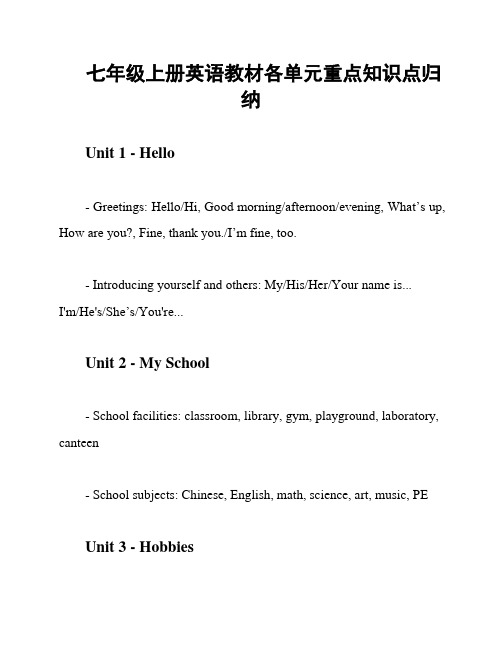
七年级上册英语教材各单元重点知识点归纳Unit 1 - Hello- Greetings: Hello/Hi, Good morning/afternoon/evening, What’s up, How are you?, Fine, thank you./I’m fine, too.- Introducing yourself and others: My/His/Her/Your name is...I'm/He's/She’s/You're...Unit 2 - My School- School facilities: classroom, library, gym, playground, laboratory, canteen- School subjects: Chinese, English, math, science, art, music, PEUnit 3 - Hobbies- Hobbies: singing, dancing, swimming, playingbasketball/football/table tennis, playing chess, painting- Talking about likes and dislikes: I like/love/enjoy... I don't like/hate...Unit 4 - My Family and Friends- Family members: mother, father, sister, brother, grandmother, grandfather- Occupations: teacher, doctor, police officer, artist, musician, athlete- Describing people: tall/short, thin/fat, long/short hair, wearing glassesUnit 5 - Food and Drinks- Food and drinks: rice, noodles, bread, meat, vegetables, fruit, milk, tea, water, juice- Ordering food and drinks: Can I have..., I'll take..., What would you like?Unit 6 - Seasons and Weather- Seasons and weather: spring, summer, fall/autumn, winter, sunny, cloudy, windy, rainy, snowy- Talking about weather: What’s the weather like today?, It's sunny/windy/rainy today.Unit 7 - Festivals and Celebrations- Festivals and celebrations: Spring Festival, Mid-Autumn Festival, National Day, Thanksgiving, Christmas- Traditions: giving red packets, eating mooncakes, watching fireworks, decorating Christmas trees。
中考英语教材知识梳理七年级上册:Units 1-4(含starter)
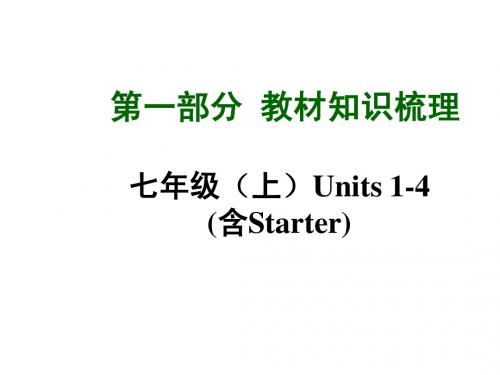
meaning of the poem.在老师的帮助下,我理解了
这首诗。
◆用作承接上下文的转折语。如: Our math teacher is friendly to us. What about yours? 我们的数学老师对我们很友好,
你们的(数学老师)怎么样?
拓展:“征求对方的看法或意见”的其他表达
句型:
What/How about doing sth.? 做„„怎么样? Shall we do sth .? 我们做„„好吗? Would you mind doing sth.?做„„你介意吗? You’d better (not) + do sth. 你最好(不要)
◆thanks for“为„„而感谢”,后其可接名词、 代词或动名词。 Thanks for your help.=Thanks for helping me.
谢谢你的帮助。
◆thanks to常带有“感谢”的感情色彩,表示 由于某个人或物的存在有了某种好的结果,其后接 名词、代词或动名词等。 Thanks to the nurses, the patients were taken good care of.幸亏有这些护士,病人得到了悉心的 照料。
单词
含义及用法
例句
意为“家;家 East or west, home is the 乡”,主要指 best.金窝银窝,不如自己的 一个人出生或 草窝。(指家) 居住的地方, She was born in London, home 含有感情色彩,but she now regards Paris 强调家里的氛 as her home. 她生在伦敦, 围和环境。 但现在把巴黎看成是她的家 乡。(指家乡)
做„„
七年级英语上册Units1—4中考教材知识梳理

16.help(v.& n.)帮助;援 助→helpful(adj.)有帮助 的 17.they(pron.)他们(主 格)→them(宾 格)→their(形容词性物主 代词)→theirs(名词性物 主代词)
1.早上好!Good morning! 2.下午好!Good afternoon! 3.晚上好!Good evening! 4.用英语 in English 5.给物品涂色 color the things 6.姓氏 last name=family name
66.hat(n.)帽子
18.see(v.)理解;明白★ 19.can(modal v.)能;会
45.dictionary(n.)词典;字 67.head(n.)头
典★
68.know(v.)知道;了解
20.say(v.)说;讲
46.teacher(n.)老师;教师 69.tidy(adj.)整洁的;井井
兴。
13.It's __mine/his/hers__.这是我的/
4.—What's __your__ name? 你叫什么名
他的/她的。
字?
14.__What__about__ this dictionary?
—__I'm__ Alan./__My__name's__ Alan./Alan. 这本字典(是谁的)呢?
凯特。
的铅笔盒在哪儿?
9.—__Are__those__ your parents? 那是你的 19.It's __under__ your bed.它在你的
父母吗?
床底下。
—Yes,__they__are__.是的,他们是。
20.__Come__on__,Jack!快点儿,杰 克!
七年级英语上册Unit1-12重点知识梳理
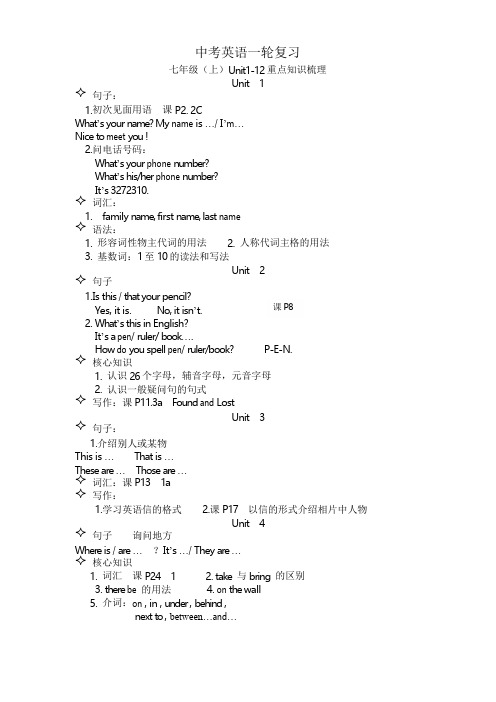
✧句子:中考英语一轮复习七年级(上)Unit1-12重点知识梳理Unit11.初次见面用语课P2.2CWhat’s your name?My name is…/I’m…Nice t o meet you!2.问电话号码:What’s your phone number?What’s his/her phone number?It’s3272310.✧词汇:1.family name,first name,last name✧语法:1.形容词性物主代词的用法2.人称代词主格的用法3.基数词:1至10的读法和写法✧句子1.Is this/that your pencil?Unit2Yes,it is.No,it isn’t.课P82.What’s this in English?It’s a pen/ruler/book….How do you spell pen/ruler/book?P-E-N.✧核心知识1.认识26个字母,辅音字母,元音字母2.认识一般疑问句的句式✧写作:课P11.3a Found and Lost✧句子:Unit31.介绍别人或某物This is…That is…These are…Those are…✧词汇:课P131a✧写作:1.学习英语信的格式2.课P17以信的形式介绍相片中人物✧句子询问地方Unit4Where is/are…?It’s…/They are…✧核心知识1.词汇课P2412.take与bring的区别3.there be的用法4.on the wall5.介词:on,in,under,behind,next to,between…and…6.认识特殊疑问句的句式✧熟读:P23.3a,P24.3,Grammar Focus✧句子Unit51.Do you have…?Yes,I do.No,I don’t.2.Does he/she have…?Yes,he/she does.No,he/she doe s n’t.3.Let’s…4.That sounds good/interesting.That’s a good idea.5.Welcome t o…✧核心知识一、there be与have的区别二、一般现在时1.现阶段经常性习惯性动作用法 2.目前的状态3.客观真理常用时间sometimes,often,every day,usually,always等状语1.动词用原形I like it.构成2.当主语是第三人称单数时,动词She likes it.要加-s(-es)He likes it.Ann g o es to work.3.be动词用I am a teacher. am,is,are He is a boy.They are girls.否定1.don’t+动词原形I don’t like it.They don’t like it.形式 2.当主语是第三人称单数时,则为:He doesn’t like it.doesn’t+动词原形Ann doesn’t go to work.一般疑问把do或d o e s放在主语的前面,后Do you like it?句面动词用原形Does Ann like it?Does he like it?附:动词第三人称单数的构成规则情况方法例词一般情况以ch,sh,x,s或o结尾的词加-s reads,saysteaches,加-es guessesfinishes以“辅音字母+y”fly--flies结尾的词把y改为i再加-es try--triescarry--carries✧熟读课本:P251a,P26G.F.,P273b,P281a,P301与3Unit6✧句子询问所喜欢的东西1.Do you like….?Yes,I do.No,I don’t.2.Does he like…?Yes,he does.No,he does.✧核心知识1.一般现在时2.可数名词与不可数名词3.lots of4.go on picnic5.health,healthy,healthily6.P361✧熟读课本:P311a,P32G.F.,P353a,P361Unit7✧句子问价格1.How much is this T-shirt?It’s10dollars.2.How much are they?They are100dollars.问颜色1.What color do you want?What color is it?购物用语:P393a1.Can I help you?What can I do for you?2.Yes,please.3.I’ll take it.4.Thank you.5.Y ou’re welcome.6.Have a look.✧核心知识两位数的基数词读法与写法P40✧熟读课本P371c,P38G.F.,P393a,P401b,P413a,P421与3Unit8✧句子1.When is your birthday?2.My birthday is January fifteenth.3.What year were you born?4.I was born in1999.5.When were you born?6.I was born in January first,1999.✧核心知识1.基数词和序数词基变序口决基变序有规律,词尾加上-th;一二三特殊记,单词结尾t d d;八减t,九减e,f要把ve替;ty把y改为i,记住前还有e;若遇到几十几,只把个位变序。
七上unit知识点总结

七上unit知识点总结Unit 1:My friendsIn this unit, students learn how to describe their friends and talk about their hobbies and interests. They also learn how to ask and answer questions about their friends and their likes and dislikes. Vocabulary words include family members, pets, hobbies, and interests. Grammar points include present simple tense, use of adjectives, and question formation.Unit 2: School lifeIn this unit, students learn how to describe their school life and daily routines. They also learn how to talk about their favorite subjects and extracurricular activities. Vocabulary words include school subjects, school facilities, and daily routines. Grammar points include present continuous tense, school subjects, and use of adverbs.Unit 3: My hometownIn this unit, students learn how to describe their hometown and talk about its characteristics and landmarks. They also learn how to give directions and talk about places of interest in their hometown. Vocabulary words include places in a city, directions, and landmarks. Grammar points include prepositions of place, giving directions, and use of there is/are.Unit 4: Food and drinkIn this unit, students learn how to describe their favorite foods and drinks and talk about their eating habits. They also learn how to order food and drink in a restaurant. Vocabulary words include types of food, drinks, and eating habits. Grammar points include countable and uncountable nouns, food and drink vocabulary, and use of some/any.Unit 5: Daily routinesIn this unit, students learn how to describe their daily routines and talk about their activities throughout the day. They also leanr how to talk about their weekly schedule and future plans. Vocabulary words include daily activities, weekly activities, and future plans. Grammar points include present simple tense for routines, adverbs of frequency, and going to for future plans.Unit 6: In the cityIn this unit, students learn how to describe a city and talk about its attractions and public transportation. They also learn how to give and follow instructions and talk about their experiences in a city. Vocabulary words include city attractions, public transportation, and giving instructions. Grammar points include imperative forms, present continuous for arrangements, and use of be going to for future intentions.Unit 7: HolidaysIn this unit, students learn how to describe their holiday experiences and talk about their preferences for different types of holidays. They also learn how to make travel plans and talk about their future holiday plans. Vocabulary words include holiday activities, travel destinations, and travel plans. Grammar points include past simple tense for holiday experiences, future with will and be going to, and use of comparatives and superlatives.Unit 8: Health and fitnessIn this unit, students learn how to talk about their health and fitness routines, and sports and exercise. They also learn how to give advice and talk about their future health and fitness plans. Vocabulary words include health and fitness vocabulary, sports and exercise, and giving advice. Grammar points include present simple for daily routines, will for predictions, and imperative forms for giving advice.These are the main knowledge points covered in the 7th grade English textbook. Students will learn how to use the vocabulary and grammar points to communicate in a variety of everyday situations and topics. The units are designed to help students develop their speaking, listening, reading, and writing skills while also learning about different cultures and aspects of daily life.。
中考英语复习课本知识整理(七级上Unit)

2010中考英语复习课本知识整理七年级上Unit 11What time do you go to school?Sec (ion A^-'1. What time do you get up?你几点起床?*■【用法透析】1)这是一"由疑间词what time弓I导ffi]特殊间句,whattim滝为几点,是就具体时刻进行提问亂"What time+助动同曲/does+主语+动词原形”是询间某人做呈事的具体时间陆句型•例如’卍What time 与What's the time-'WhaEtim渥短语,用来询间句中的状语.例如…What time da you begin classes in the morning?早農你们几点开始上课?At 8:00 p^taK=begiii classes at S OQ in the inoming)^What's the timeSg^T也是用来询问时间的.心What's ±etime? =What time is it?回答妾用It■侄壬语如What's the time?几点了?It's 7:30.七点了.存2)句中get up是固宦短唐,意思为"起床二up是副词而不是介词口与其相同意义的词组不翊融e叩,如匸*I am up at sevie n oclock扃丄匚TU ”【发散思维】get back归还,取加,get home到家,get go到达,get for为某人拿(取)买,get from从某人/某物那得到……2.1 usually get up at five o 我通常C在五点钟起床。
【用法透析】1)句中usually与often 一样都是频度副词,常用于动词be之后,行为动词之前。
always意思是总是” 永远”表示动作重复,状态继续,中间没有间断,通常用来修饰动词的一般时态。
七年级上册英语知识点 (全册)

七年级上册英语知识点 (全册)1. 单元一:Hello, my name is.a. 重点词汇:- Hello: 问候语- Good morning: 早上好- Good afternoon: 下午好- Good evening: 晚上好- My name is: 我的名字是- How are you?: 你好吗?- I'm fine, thank you. And you?: 我很好,谢谢。
你呢?- Goodbye: 再见b. 重点句型:- Introducing yourself: 介绍自己- Hello, my name is [name]. I'm from [country/city].- Asking for introduction: 询问对方介绍- Nice to meet you. Can you introduce yourself?2. 单元二:What's your name?a. 重点词汇:- What's your name?: 你的名字是什么?- My name is: 我的名字是- How old are you?: 你多大了?- I'm 12 years old: 我12岁- Where are you from?: 你来自哪里?- I'm from China: 我来自中国b. 重点句型:- Asking someone's name and age: 询问某人的名字和年龄- What's your name? My name is [name]. How old are you? I'm [age] years old.- Introducing your friends: 介绍你的朋友- This is my friend [name]. She/He is [age] years old.3. 单元三:Hello, how are you?a. 重点词汇:- Hello: 问候语- How are you?: 你好吗?- I'm fine, thank you. And you?: 我很好,谢谢。
人教版七年级上册英语各单元知识点归纳

人教版七年级上册英语各单元知识点归纳
以下是七年级上册英语各单元知识点归纳:
第一单元:
重点词汇:学习并芋握课本中的基本词汇,包括名词、动词、形容词等。
语法知识点:学习陈述句、疑问句和感叹句的基本结构和用法,以及简单句的基本句型。
阅读理解:学习基本的阅读技巧,如扫读、跳读、精读等,培养快速理解和把握文章大意的能力。
写作训练:学习写简单的句子和段落,芋握基本的写作技巧。
如分段、过渡、突出主题等。
第二单元:
重点词汇:进一步扩大词汇量,学习更多的固定搭配和短语。
语法知识点:学习现在进行时和一般现在时的基本结构和用法,以及比较级和最高级的构成及用法。
阅读理解:提高阅读速度和理解能力,培养根据上下文猜测词义和推理判断的能力。
写作训练:学习写电子邮件、信件等实用文体,注意写作的得体性和规范性。
第三单元:
重点词汇:注意近义词和反义词的辨析,能准确区分它们的用法。
语法知识点:学习一般过去时的基本结构和用法,了解定语从句和状
语从句的用法。
阅读理解:培养深层阅读的能力,理解文章的深层含义和作者的意图。
写作训练:学习写简单的说明文和议论文.注意文章的条理性和逻辑性。
第四单元:
重点词汇:芋握课本中的重点词汇,包括其意思和用法。
语法知识点:了解并列句和并列复合句的构成和甩法,以及宾语从句的用法。
阅读理解:提高推理判断的能力。
能回答关于文章细节、深层含义和作者观点等方面的问题。
写作训练:学习写复杂的记叙文.说明文和议论文。
注意文章的拓展和创新性。
七年级上册unit知识点归纳

七年级上册unit知识点归纳七年级上册的学习是初中学习的开端,这一学段相当于学习的基础知识,为以后的学习奠定了坚实的基础。
在这个学段里,学生学习了很多不同的科目,其中也包括了英语。
七年级上册的英语课程是学习英语的开端,它会引导学生在英语方面掌握基本知识和语言技能。
本文旨在为大家整理七年级上册英语重要的知识点,并通过不同的小节来详细讨论。
一、语法知识点在英语学习的早期阶段,语法知识点是至关重要的。
学生需要了解不同的语法知识点,这样才能更好地理解英语语言的建构,从而更好地掌握语言技能。
以下是针对七年级上册英语学习中最重要的语法知识点:1. Be动词:be动词是英语语言中最基本的动词之一,学生需要在这个学段中学会正确地使用它。
Be动词有三个形式,分别是am、is和are。
2. 祈使句:祈使句是一个非常有用的语句形式,它用来表达请求、命令等。
祈使句的句子结构非常简单,只有一个动词。
3. Do和Does:这两个词是英语中的助动词,学生需要在这个学段中了解它们的用法。
4. There be句型:There be句型通常用来描述某个地方或者某个场景中有什么,例如:There is a book on the table. 学生需要了解这个句型的用法和结构。
5. 句子基本成分:学生需要学会辨认句子中的主语、谓语、宾语等基本成分,以便更好地理解句子的意思。
二、词汇知识点掌握丰富的词汇量是学习英语的关键。
学生需要在这一学段中掌握一些基本英语单词和短语,以便在以后的学习中更好地应用它们。
以下是七年级上册英语词汇知识点:1. 介词和副词:介词和副词是英语中非常常见的词汇,学生需要掌握它们的用法,以便更好地表达自己的意思。
2. 名词和动词:名词和动词是英语语言中最基本的单词,学生也需要在这个学段中掌握一些基本的词汇。
3. 形容词和副词的比较级和最高级:形容词和副词的比较级和最高级是英语中最常见的语法点之一。
学生需要在这个学段中掌握这些词汇,以便更好地形容人或者事物。
七年级上英语单元知识点

七年级上英语单元知识点
以下是七年级上英语单元的重点知识点概述:
Unit 1: Greetings
学习如何用英语问候和介绍自己,语言运用中出现的常见交际
用语。
Unit 2: School Life
学习有关学校生活的英语词汇,如科目、学致、校园设施等。
Unit 3: Hobbies
学习谈论自己的爱好和喜欢的事物,包括娱乐活动和体育运动。
Unit 4: Food and Drinks
学习英语菜肴和饮料的名称和描述,以及点餐时需要用到的常用短语。
Unit 5: Family
学习如何用英语谈论家庭、家庭成员和家庭活动。
Unit 6: Bigger, Stronger, Faster
介绍有关体育运动、运动员和运动比赛的英语词汇和短语。
Unit 7: My Country
学习有关国家和旅游景点的英语词汇,包括如何询问和提供旅行计划。
Unit 8: My Friends and I
学习介绍朋友和描述人物的英语词汇,以及谈论社交活动和兴趣爱好。
Unit 9: My favorite things
学习谈论自己喜欢的事物和如何描述它们的英语表达方式。
Unit 10: On the farm
学习有关动物、植物和农业的英语词汇,以及如何描述生态环境和自然风光。
总之,七年级上英语单元的重点在于学习基本的交际用语和词汇,为语言学习的基础打下良好的基础。
同时,学习这些单元的内容也有助于拓展学生的视野,了解与英语相关的文化知识和洞察力。
七年级上英语各单元的知识点

七年级上英语各单元的知识点作为七年级英语学习的重要组成部分,各单元的知识点扎实掌握对于学生提高英语水平至关重要。
本文将全面介绍七年级上英语各单元的知识点,帮助学生深入了解和掌握相关知识。
第一单元:英语字母和音标在学习英语时,最基本的就是掌握英语字母和音标。
这是英语学习的基础,也是学好英语的先决条件。
七年级上英语第一单元主要学习英语字母和音标的认读和书写,掌握26个英文字母及其大小写形式、读音及对应音标。
第二单元:数词数词是英语中基本的语言元素,是英语中不可缺少的一部分。
在七年级上第二单元中,主要掌握基数词和序数词的读法、书写和用法。
学会表达年龄、日期、时间等基本的数字概念。
第三单元:人称代词和动词的to be人称代词和动词的to be是英语语法中的基础知识点,在七年级上第三单元中需要掌握的重点是人称代词的主格、宾格、名词性物主代词和反身代词的用法,以及动词to be在人称代词和形容词后面的变化。
第四单元:一般现在时七年级上第四单元的重点是学习一般现在时。
需要学生掌握的知识点有:一般现在时的构成、肯否定句、疑问句、特殊疑问句的构成和用法;常用的时间状语、频率副词和动词的第三人称单数形式等。
第五单元:表示喜好和习惯的动词在七年级上第五单元,学习了表示喜好和习惯的动词。
这个单元的重点是学生掌握这些动词的基本用法,了解动词与名词、形容词连用时的搭配和构成等。
同时,学习了询问和对答案有关爱好方面的对话。
第六单元:there be句型和家具第六单元的学习中,学生需要掌握there be句型的构成、特殊问句、肯定和否定句的构成和用法;能够描述自己房间中的家具、物品等,并通过描述与他人交流信息。
第七单元:时间状语从句本单元主要教授时间状语从句的用法和形式。
需要学生掌握的知识点有:时间状语从句的引导词、构成和意义等;掌握时间状语从句在主句中的位置和语序,以及与主句之间的其他语法关系。
第八单元:一般过去时七年级上第八单元的重点是掌握一般过去时的构成、肯非定句、疑问句、特殊疑问句的构成和用法等。
七年级英语上册重点知识归纳
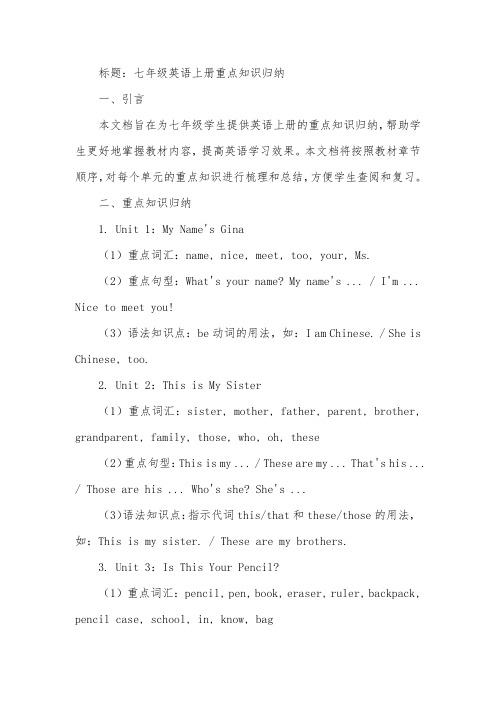
标题:七年级英语上册重点知识归纳一、引言本文档旨在为七年级学生提供英语上册的重点知识归纳,帮助学生更好地掌握教材内容,提高英语学习效果。
本文档将按照教材章节顺序,对每个单元的重点知识进行梳理和总结,方便学生查阅和复习。
二、重点知识归纳1. Unit 1:My Name's Gina(1)重点词汇:name, nice, meet, too, your, Ms.(2)重点句型:What's your name? My name's ... / I'm ... Nice to meet you!(3)语法知识点:be动词的用法,如:I am Chinese. / She is Chinese, too.2. Unit 2:This is My Sister(1)重点词汇:sister, mother, father, parent, brother, grandparent, family, those, who, oh, these(2)重点句型:This is my ... / These are my ... That's his ... / Those are his ... Who's she? She's ...(3)语法知识点:指示代词this/that和these/those的用法,如:This is my sister. / These are my brothers.3. Unit 3:Is This Your Pencil?(1)重点词汇:pencil, pen, book, eraser, ruler, backpack, pencil case, school, in, know, bag(2)重点句型:Is this your ...? Yes, it is. / No, it isn't. Are these your ...? Yes, they are. / No, they aren't.(3)语法知识点:一般疑问句的构成及回答,如:Is this your pencil? Yes, it is. / No, it isn't.4. Unit 4:Where's My Schoolbag?(1)重点词汇:where, table, bed, dresser, bookcase, sofa, chair, drawer, plant, under, they(2)重点句型:Where's the ...? It's on/in/under ... Where are the ...? They're on/in/under ...(3)语法知识点:方位介词的用法,如:The backpack is under the table. / The books are in the bookcase.5. Unit 5:Do You Have a Soccer Ball?(1)重点词汇:have, soccer ball, ping-pong ball, tennis ball, basketball, volleyball, let's = let us, play, sound, good, sport, go to same, club(2)重点句型:Do you have a ...? Yes, I do. / No, I don't. Let's play ... That sounds good.(3)语法知识点:一般现在时动词have的用法,如:I have a soccer ball. / They don't have a basketball.6. Unit 6:Do You Like Bananas?(1)重点词汇:like, hamburger, tomato, broccoli, French fries, orange, ice cream, salad, strawberry, pear(2)重点句型:Do you like ...? Yes, I do. / No, I don't.I like ... / I don't like ...(3)语法知识点:一般现在时动词like的用法,如:She likes salad. / They don't like broccoli.7. Unit 7:How Much Are These Socks?(1)重点词汇:how much, pants, sock, shirt, T-shirt, shorts, sweater, shoe, skirt, dollar, well done sth., big sale , cheap , color , price .(2)在句式上需要注意疑问句和否定句的使用,例如:“How much is/are ...?”和“It's not expensive.”等。
七年级英语上个单元知识点

七年级英语上个单元知识点英语是国际通用语言,熟练掌握英语是非常重要的。
对于七年级的学生而言,英语课程是必修科目之一。
上个单元中,我们学习了许多重要的知识点,本文将为大家梳理总结。
一、名词名词是英语语法中最基本的部分之一,名词用于指代或描述人、物、地点、活动等。
名词可以分为可数名词和不可数名词。
可数名词表示可以被数数的人、事、物,而不可数名词则表示不可以被数数的物品。
二、冠词冠词是用来修饰名词的词语,包括定冠词(the)和不定冠词(a或an)。
使用冠词有助于表达句子的准确含义。
例如,在句子“Could you pass me a pen, please?”中,不定冠词a起到了限定名词pen的作用。
三、代词代词是一种可以替代名词的字,它们可以用来指代特定的人或物。
代词可以分为主格代词和宾格代词。
主格代词用于主语位置,宾格代词用于宾语位置。
例如,在句子“Peter likes to play basketball, and he is very good at it.”中,he代表的是前面出现过的Peter。
四、动词动词是英语语法中最为重要的部分之一,可以表示行为、状态或者是存在。
动词需要根据时态、语态和人称等不同维度进行变化。
例如,在句子中,“She is singing.”中,singing是动词,表示现在进行式。
五、形容词和副词形容词和副词是英语语法中用于修饰名词、动词和其他形容词的词汇。
形容词用于描述名词,并且通常紧跟在名词前面。
副词则用于描述动词、形容词和副词等,并且通常紧跟在这些词汇后面。
六、介词介词通常用于描述与其他词汇之间的关系。
在句子中,“in”、“at”、“on”等都是介词。
例如,在句子“Please put the book on the table.”中,“on”用于表示书放在桌子上。
七、连词连词是连接词语、短语或者是从句的一种词汇。
包括并列连词、从属连词和副词连词等。
例如,在句子“John is a teacher, but healso likes to cook.”中,“but”就用于连接两个不同的句子。
人教版七年级英语上册各单元知识点总结
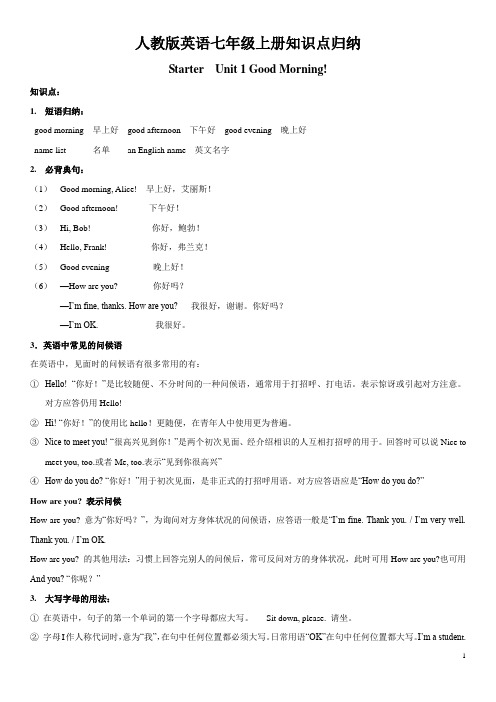
人教版英语七年级上册知识点归纳Starter Unit 1 Good Morning!知识点:1.短语归纳:good morning 早上好good afternoon 下午好good evening 晚上好name list 名单an English name 英文名字2.必背典句:(1)Good morning, Alice! 早上好,艾丽斯!(2)Good afternoon! 下午好!(3)Hi, Bob! 你好,鲍勃!(4)Hello, Frank! 你好,弗兰克!(5)Good evening 晚上好!(6)—How are you? 你好吗?—I’m fine, thanks. How are you? 我很好,谢谢。
你好吗?—I’m OK. 我很好。
3.英语中常见的问候语在英语中,见面时的问候语有很多常用的有:①Hello! “你好!”是比较随便、不分时间的一种问候语,通常用于打招呼、打电话。
表示惊讶或引起对方注意。
对方应答仍用Hello!②Hi! “你好!”的使用比hello!更随便,在青年人中使用更为普遍。
③Nice to meet you! “很高兴见到你!”是两个初次见面、经介绍相识的人互相打招呼的用于。
回答时可以说Nice tomeet you, too.或者Me, too.表示“见到你很高兴”④How do you do? “你好!”用于初次见面,是非正式的打招呼用语。
对方应答语应是“How do you do?”How are you? 表示问候How are you? 意为“你好吗?”,为询问对方身体状况的问候语,应答语一般是“I’m fine. Thank you. / I’m very well. Thank you. / I’m OK.How are you? 的其他用法:习惯上回答完别人的问候后,常可反问对方的身体状况,此时可用How are you?也可用And you? “你呢?”3.大写字母的用法:①在英语中,句子的第一个单词的第一个字母都应大写。
2011年中考英语复习课本知识整理七年级上(

2011年中考英语复习课本知识整理七年级上(二)Unit 2 What’s this in English?一、单元目标定位二、教材优化全析Section A1.What’s this in English? 这个用英语怎么说?【用法透析】1)英语中,常用“What's this/that in English?”这个句型来询问事物。
回答时要用“It's a/an +名词.”,其中的It 不可改为This 或That。
如:—What's this in English? 这个用英语怎么说?—It's a bike. 它是自行车。
—What's that in English? 那个用英语怎么说?—It's an apple. 它是苹果。
2) in English 是一个介词短语,意思是“用英语”,其中介词in指“用某种语言”。
如:in Chinese 用汉语。
“in +语言”表示“用……语言”的意思。
例如:Can you sing this song in English? 你能用英语唱这首歌吗?2.It’s an organe.它是一个橘子。
【用法透析】句中this指代“这个东西”。
回答时用it代替this,以避免重复。
3.NBA【用法透析】NBA是美国职业篮球协会缩写。
英语中有许多缩写,如:TV电视CD光盘,CPC中国共产党,PRC中华人民共和国,UFO不明飞行物。
注意:缩略词的每个字母都要大写。
Section B1. Spell it, please.请拼写它。
【用法透视】Spell it, please.是Can you…, please?句型的省略形式。
当询问对方能否干什么或对方会不会干什么时,用这一句型。
这是一个一般疑问句,用升调,表示请求。
意思是“请你……可以吗?”Can you spell…,please?请你把……拼读一下可以吗?若作肯定回答时则先用Yes, I can. ,然后按字母顺序拼出,如果同一个字母连续出现两次时,则在其前面加上double(两个,一双),有“双写”之意。
中考知识点一(七年级上重点知识)

人教版英语中考复习知识点七年级上册知识点Unit 1-Unit 2重点句型1. —My name’s Jenny. —I’m Gina. Nice to meet you.2. —What’s your/his/her name? —My/His/Her name is … .3. What’s your/his/her family/first name?4. —What’s your telephone number? —It’s 218-9176.5. What’s his/ her telephone number?6. —What’s this/that in English? —It’s a ruler.7. —Is this/that your pencil? —Yes, it is./No, it isn’t.8. How do you spell pencil?/Spell pencil./Can you spell pencil?9. Is that your computer game in the lost and found case?10. Call Alan at 495-3539.重点语法be在一般现在时中的基本用法:I用am, you用are,is跟着他她它。
He ,she ,it 用is,we, you they都用are。
单数名词用is,复数名词都用are。
be的几种形式:is, am, are —being —was, were —been主谓一致:主谓一致的15种常考情况:1.表示时间,重量,数目,价格,长度,数学运算等的词或短语作主语时,尽管他们是复数形式,但如果把这些复数形式的词或短语看作是一个整体,谓语动词用单数形式。
Two months is quite a long time. Twenty dollars is enough.2.动词不定式,动名词,从句或不可数名词作主语时,谓语动词用单数。
- 1、下载文档前请自行甄别文档内容的完整性,平台不提供额外的编辑、内容补充、找答案等附加服务。
- 2、"仅部分预览"的文档,不可在线预览部分如存在完整性等问题,可反馈申请退款(可完整预览的文档不适用该条件!)。
- 3、如文档侵犯您的权益,请联系客服反馈,我们会尽快为您处理(人工客服工作时间:9:00-18:30)。
2011中考英语复习课本知识整理七年级上Unit 8When is your birthday?【发散思维】英语中的12个月每个单词的首字母都要大写。
一年包括四季,每上季节又包括三个月。
spring(春季):Februany,March,Aril(2~4月)summer(夏季):May,June,July(5~7月)autumn(秋季):August,September,October(8~10月)winter(冬季):November,December.Januany(11~1月)2.How old are you ?你多大了?【用法透析】是就年龄进行提问的特殊疑问句,其句型结构为:How old+be+主语?表示“……几岁/多大了”,句中how old意为“多大年龄/几岁”,在回答这个句型时,常用“主语+be+数词+years/months old”来表示,也可以直接说出年龄。
例如:—How old is your father? —你爸爸多大了?—He is sixty. —他六十岁了。
【拓展探究】:How old are you? 的同义句有:What’s your age? / May I know your age?【发散思维】 At the age of 是用来表示年龄一种说法。
What age are you? 你几岁 ? ( 你多大年龄 ? )在英语中表达年龄时常说:She‘s eight. 也可以说:She is eight years of age .还可以说:She is eight years old.但不可说:She is eight age.“年龄”表示法还有:(1)“at the age of + 基数词”或“at +基数词”。
基数词后不再加 years old , 此短语常作状语。
At the age of eight ,he went to an island with his parents .(2)“of + 基数词”。
此结构常作后置定语,数词后不能接 years old。
At that time , he was just a boy , of sixteen . 当时,他只是一个十六岁的男孩。
“基数词-year-old”。
此结构常用前置定语。
When he was an eight-year-old boy , he began to make a living . 当他是一个八岁的男孩时,就开始谋生了。
“be in one’s + teens / twenties / thirties……nineties”表示“在某人十几岁/二十几岁/三十几岁……九十几岁时”。
He was in is fifties .(4)“aged + 基数词”。
此结构常用后置定语。
Mr Smith , a foreigner aged 30 , works in north China. 史密斯先生是一位30多岁的工程师,在华北工作。
掌握了年龄的常见表达法,就能一句多译。
请看:A. 珍妮是一个十五岁的女孩。
Jenny is a fifteen-year-old girl . / Jenny is a girl of fifteen . / Jenny is a girl aged fifteen .B. 他三岁时就能做诗。
When he was three (years old) , he could write poems . / When he was three years of age , he could write poems . / At (the age of ) three , he could write poems【误区警示】问到年龄时,有人会回答It’s a secret.。
因为在西方国家,通常不向陌生人、长辈、上级、妇女询问年龄。
尤其是成年妇女,最忌讳别人问他们的年龄。
西方人日常生活不打听、不询问的事情有:年龄、婚姻状况、收入、地址、经历、工作等等。
Section B1.Basketball game.篮球比赛。
English speech contest英语演讲比赛。
【语法聚焦】1when引导的特殊疑问句(参见教材优化全析Section A. 1)2基数词变序数词的规律:英语中,用来表示事物的数目的词是基数词,用来表示事物顺序的词是序数词。
那么基数词变序数的口诀是什么呢?请记住:“基变序有规律,结尾字母是th”,“一、二、三特殊记,结尾字母t,d,d”,“八去t,九去e,f要把ve替”,“ty将y变成i,th前面有个e”,“几十几,也好记,只变个位就可以”。
[特别说明]在基数词改为序数词时,多数都在基数词尾加th,但one,too,three所对应的序数词依次为first,second和third(即“结尾字母t,d,d”)。
还要注意:eight在加th时要去掉末尾字母t(eight →eighth,即“八去t”);nine在加th时要去掉字母e(nine→ninth,即“九去e”);以ve结尾在加th时,应先把ve用f换掉,然后再加th。
(如:five→fifth,twelve→twelfth,即f要把ve替);以ty 结尾的基数词在变成序数词,应先将y变i,th前面还要加上字母e(如:twenty→twentieth,thirty →thirtieth,……ninety→ninetieth等,即ty把y变成i,th前面还有一个e);类似twenty-four,twenty-six这样“几十几”的基数词在改为序数词时,只需变个位就可以了。
如:twenty-four→twenty-fourth,twenty-six→twenty-sixth等。
三、【典型试题】1.Tom and Ann stood in front of the mirror and looked at ________.A. herB. himC. themD. themselves解析:D。
本题考查反身代词的运用。
依据题意:汤姆和安站在镜子前,看着他们自己。
需要用反身代词,故用D。
2.September 10th is ___________.A. Women's DayB. Children's DayC. Mid-autumn DayD. Teachers' Day解析:D。
本题考查节日名称。
本题属于社会常识。
3.Have you learned ____ lesson?A. twelveB. twelvethC. the twelfthD. the twelve解析:C。
本题考查序数词的用法。
题意为:你们学第十二课了吗?以ve结尾在加th时,应先把ve用f换掉,然后再加th。
Ⅲ.单项选择。
()1.________a Music Festival at your school?A. There isB. There hasC. Is thereD. Are there()2.—_______your father like pop music?—Yes, _________.A. Do;he doB. Does;he doesC. Do;he likeD. Does;he likes()3.—__________is the school trip?—__________April.A. When;InB. What;OnC. Where;InD. When;On()4.There are usually(通常)__________days in February.A. twenty-eightB. twenty-nineC. thirtyD. thirty-one()5.There are twelve months in a __________.A. season(季节)B. dateC. yearD. school yearIV. 连词成句。
1.music,sounds,this,boring._____________________2.1st,is,my,birthday,brother's Januany._______________3.doesn't salad,like,Rose.________________________4.Where, your ,game,computer,is__________?5.March,3rd,on,birthday,my,is__________________.V.从B栏中找出A栏中正确的答语:A B1.How much is this T—shirt?A:It’s blue2.What color is your sweater?B:Mary is3.Is there a book on the desk?C:Yes,there is4.Who is your sister?D:The black one.5.Which is your hat?E:It’s 30 dollars.6.What’s this in English? F.No,I don’t7.Do you like bananas?G:It’s an ice cream8.Where’s Tony?H:He’s in the room.VI.补全对话,每空填一词,使对话完整、达意。
(A:_____1______ is you birthday?B:My birthday is Ocotober 17th.A:What _____2_______were you born?B:I was born _____3_____1989.A:⑷____4_____ you are _____5_____years and _____6_____months old. Will you ______7_____a birthday party?B:Yes,of course.A:_____8_____can go to your party?B:My good friends.A:Can I go to your party?B:Of course you ____9____. You’re a good friend. ____10_____to my party!A:Thank you.VII.把下列英文译成汉语。
1.What events do you have at your school?_____________________2.My mother's birthday is Januany 1st. ______________________3.What year were you born?______________________4.I was born in 1966._________________5.When is your birthday, Vera?______________________VIII.完形填空。
